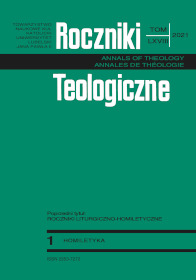Wstęp pastoralny do księgi Ezechiela
The Pastoral Introduction to the Book of Ezekiel
Author(s): Andrzej Sebastian Jasiński OFMSubject(s): Christian Theology and Religion, Theology and Religion, Pastoral Theology
Published by: Towarzystwo Naukowe KUL & Katolicki Uniwersytet Lubelski Jana Pawła II
Keywords: Book of Ezekiel; prophet; Israel; Babylonian exile; judgment; salvation
Summary/Abstract: The Book of Ezekiel is one of the scriptures, that is not often read in the liturgy of the Mass. The message of the scripture is not however secondary. The book was written during the Babylonian exile in the 6th century BC. The writing refers to the intricate history of Israel: the breaking of the covenant with Yahweh, and the consequences of these events. Israel has been called a rebel people (Ez 2; 3). The nation was burdened with sins that extended to all of the past of the nation (Ez 16; 20; 23). Ezekiel was called to explain to the exiles the current state of Israel in Babylon. The prophet foretells judgment, but after that judgment will follow the restoration of the nation. The structure of the book includes the following parts: introduction (Ez 1:1-3:15), oracles against Israel (Ez 3:16-24:27), oracles against foreign nations (Ez 25:1-32:32), oracles about salvation (Ez 33:1-48:35). The text of Ezekiel 40-48 has the special character (the second vision of the temple). The writing is not a catastrophic work (although it contains such pictures), it is a book of the hope. It was the experience of Ezekiel who shared his thoughts not only with his compatriots, but with the every person of the world.
Journal: Roczniki Teologiczne
- Issue Year: 68/2021
- Issue No: 1
- Page Range: 49-67
- Page Count: 19
- Language: Polish

